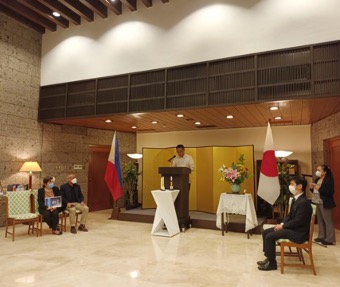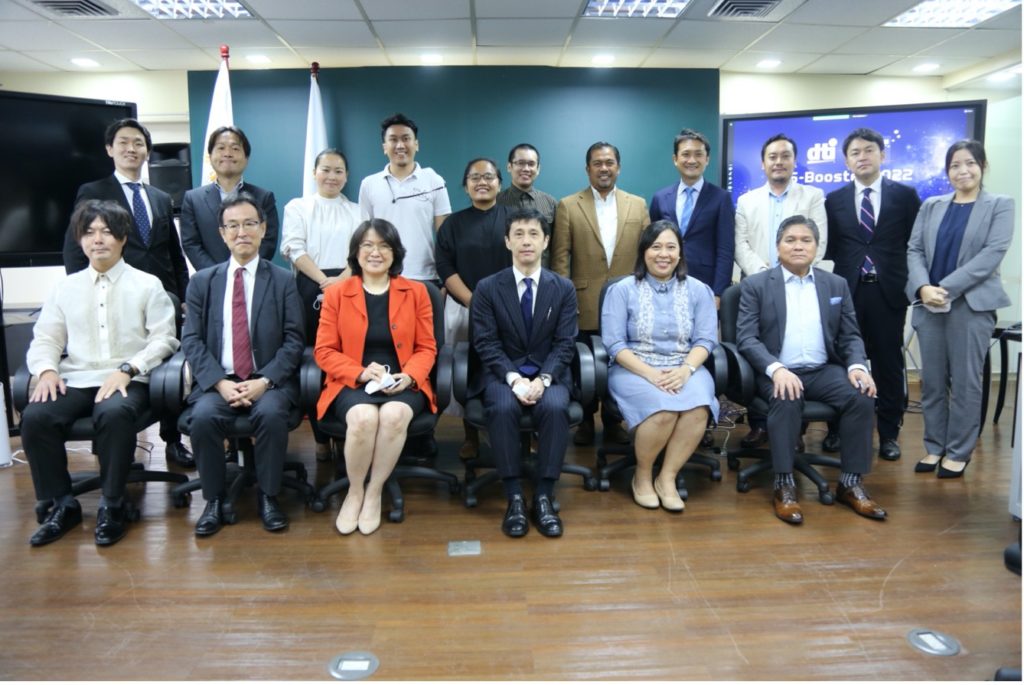
Japanese Ambassador to the Philippines, Ambassador Koshikawa Kazuhiko received Philippine government officials and private sector space players to a reception he hosted at his official residence, for the 14-member delegation from Japan led by the Director General Shoichiro Sakaguchi of the Japan Cabinet Office Space Development Strategy Promotion Secretariat. The Japanese mission was organized to encourage Philippine startup participation in Japan’s S-booster 2022 Competition. Present in the reception were Department of Science and Technology (DOST) Secretary Fortunato T. de la Peña, and Philippine Space Agency (PhilSA) Director General Joseph S. Marciano, Jr.
In his remarks at the reception, Ambassador Koshikawa said that “at the request of the Philippine government, the Government of Japan stands ready to support space-related projects of the Philippine government through technical cooperation, dispatch of experts, ODA loans and so on.” He conveyed that “Japan is looking forward to deepening our cooperation in the space area with the Philippines,” a declaration which was well received by Philippine government and the private sector guests.
DOST Secretary de la Peña expressed his deep appreciation for the collaboration in starting the Philippines’ space technology program, also giving credit to his predecessor, former DOST Secretary Mario Montejo and initial partners such as the Japanese universities and Japan space agency. He mentioned that Filipino graduates from these universities took on the task of doing the country’s own microsatellites and nanosatellites. Secretary de la Peña conveyed that he is aware and assured that the work will continue now that the task is with the Philippine Space Agency (PhilSA).
Guests from the private sector included chairpersons and founders of associations such as the Electronic Industries Association of the Philippines Inc. (EIAPI), Aerospace Industries Association of the Philippines (AIAP), Philippine Chamber of Agriculture and Food Inc., (PCAFI) as well as academic institutions and incubation centers such as Batangas State University, Animo Labs and Angel Hack of De la Salle University, Ateneo Innovation Center, Cawil.AI, and QBO.
S-booster is an annual competition hosted by the Japan Cabinet Office for Space Development, Japan Aerospace Exploration Agency (JAXA), and New Energy and Industrial Technology Development Organization (NEDO). The pitch competition aims to find exceptional business ideas utilizing space assets for commercialization. Philippine Commercial Counselor to Japan, Dita Angara-Mathay who has been working with the Cabinet Office of Space Policy to promote S-booster to the Philippine startup community in the last three years said, “Philippine participation in Japan’s S-booster program is important because it will open up access of our startup community to new sources of overseas venture capital as well as expand their activities to cover the use of big data from space for commercial applications in maritime security, agribusiness, environmental protection, disaster mitigation geo mapping, logistics, and others”.
The main activity organized for the Japanese Space Mission by the DTI Competitiveness and Innovation Group (CIG), Philippine Trade and Investment Center in Tokyo (PTIC-Tokyo), Foreign Trade Service Corps (FTSC), and Export Marketing Bureau (EMB), was a hybrid seminar participated in by 111 members of the startup community, the academe, and industry leaders in the aerospace, electronics, agriculture, IT, and AI sectors.

The informative session equipped stakeholders with details of the S-Booster Competition, the DTI CIG’s initiatives in innovation, and the Philippine Space Agency’s space programs.
Director General Sakaguchi said that S-Booster is open to participation of companies and individuals in Japan, Asia and Oceania. He said that the campaign will support commercialization of ideas with prize money, mentorships by experts who will provide such assistance as managerial advice and business matching opportunities. He added that at the final selection, finalists will present their ideas to venture capitalists and business sponsors that include Kyocera, Mitsui & Co., SONY, Honda, SKY Perfect for JSAT Group and Risktaker. Lastly, he clarified that space business is not just about rockets, satellites, and private space stations but also ground business utilizing satellite data and technology. DTI CIG Undersecretary, Dr. Rafaelita Aldaba emphasized that space exploration and satellite technology are priority areas that will be pursued in the future.
Seminar attendees were also buoyed by testimonials of past Philippine winners and finalists. Ariston Gonzalez, a finalist for the 2019 S-booster Grand Pitch, won the 2021 Michibiki Award for his idea on low-cost Tsunami Detection Bay System and Alert Message Application. Ms. Ellarizza Fredeluces of Buntabay also won the 2021 Spresense award for a project proposal entitled “GNSS Detecting Water Level of River to Detect Flooding”.
Interested participants may submit their business proposals until 20 June 2022 at 5:00 PM JST. To learn more about the S-booster program, please visit their official website at https://www.s-booster.jp/en/2022/. ♦
Date of Release: 09 June 2022


